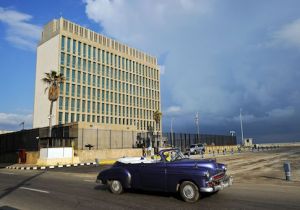
Demonstrations in Miami in 2015 against the opening of the U.S. embassy in Havana.
(Michele Eve Sandberg/Corbis, via Getty Images)
By Frances Robles, New York Times
Julio V. Ruiz, a 71-year-old retired psychiatrist with a long history of participating in talks with the Cuban government, tried to ignore the persistent knocking at his door by two strangers when they showed up uninvited one afternoon last week.
The rapping on the door went on for 15 minutes. It was the F.B.I.
“Everyone tells you not to speak to them and to call your lawyer,” Dr. Ruiz said. “But you get scared. I was measured in what I said, and gave them a brief history of Cuba going back to the 19th century.”
At least five Cuban-Americans in Miami, including Dr. Ruiz, who have opposed a trade embargo with Cuba and promoted better relations with the communist government in Havana, said they received surprise visits in the past week from federal agents.
The law enforcement representatives were vague about their intentions, gave only their first names, and asked questions that seemed intended to learn about contacts with Cuban diplomats, Dr. Ruiz said.
For many, the questions triggered decades-old concerns dating back to a time when ideological divisions in the Cuban exile community were more pronounced, and sometimes were coupled with law enforcement scrutiny.
Those contacted were among a large group of exiles who came to the United States as children in the early 1960s, fleeing the Castro dictatorship. As adults, they supported engaging with the Cuban government, even when doing so was deeply unpopular in South Florida and often caused them to be ostracized.
Some of those contacted said they feared that they were being targeted as part of President Trump’s moves to curtail travel to Cuba and roll back new openings with Havana that had been enacted by the Obama administration.
The meetings come in the wake of a series of bizarre ailments, which some suggested could be linked to possible sonic or microwave attacks, that afflicted more than three dozen American diplomats and family members in Cuba and China. The incidents in Cuba resulted in a diplomatic rupture between Havana and Washington, and the U.S. embassy in Havana is down to a skeleton staff.
But there was no sign that the recent meetings were connected to any investigation of those reports. A brochure the agents left with one of the men suggested that the agents were trying to alert him to the possibility that he was being targeted by spies.
Article Continues Here: FBI Warns Activists


